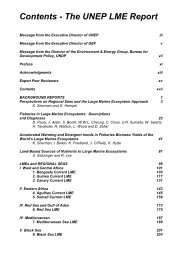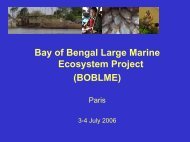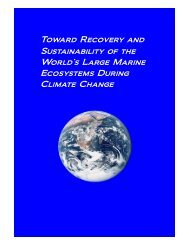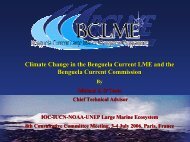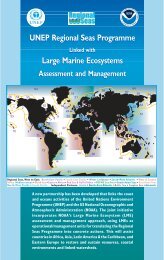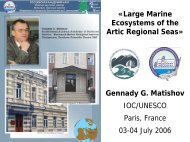Sustaining the World's Large Marine Ecosystems
Sustaining the World's Large Marine Ecosystems
Sustaining the World's Large Marine Ecosystems
Create successful ePaper yourself
Turn your PDF publications into a flip-book with our unique Google optimized e-Paper software.
Paradigm Shift<br />
The five module LME approach has provided an effective way forward in<br />
developing countries for guiding scientists, managers and policy makers in<br />
introducing ecosystem based management practices. While ecologists have long<br />
studied <strong>the</strong> structure and function of marine ecosystems (Lubchenco 1994, Levin<br />
and Lubchenco 2008), <strong>the</strong> applied and pragmatic LME approach is directed to<br />
assessing and managing large ocean areas for recovering and sustaining marine<br />
goods and services. Previous management approaches have often failed to look<br />
beyond <strong>the</strong> individual sectors. Those with regulatory authority over one sector<br />
often make decisions on that sector’s uses in isolation from <strong>the</strong> decisions<br />
involving o<strong>the</strong>r sectors. Fish harvest decisions are often made on a species-byspecies<br />
basis, without accounting for <strong>the</strong> numerous interactions such as<br />
predator-prey or competitive relationships among <strong>the</strong> species.<br />
Ecosystem-based management represents a paradigm shift away from a sector<br />
by sector approach and requires a better overall understanding of marine<br />
ecosystems and of <strong>the</strong> transboundary nature of water governance, fisheries,<br />
climate change, and water pollution (Figure 4).<br />
FROM<br />
120<br />
TO<br />
Individual species <strong>Ecosystems</strong><br />
Small spatial scale Multiple scales<br />
Short-term perspective Long-term perspective<br />
Humans: independent of ecosystems Humans: integral part of ecosystems<br />
Management divorced from research Adaptive management<br />
Managing commodities <strong>Sustaining</strong> production potential for goods<br />
and services<br />
Figure 4. Ecosystem management requires a paradigm shift. From Jane Lubchenco, 1994.<br />
Education and outreach activities supporting ecosystem-based management<br />
within LMEs are focused on:<br />
(1) Continued investment in sound science and data on LME (i) productivity; (ii)<br />
fish and fisheries; (iii) pollution and ecosystem health; (iv) socioeconomics; and<br />
(v) governance modules, with an emphasis on transboundary assessments for<br />
sound decision-making.<br />
(2) Improved understanding of <strong>the</strong> synergistic role of <strong>the</strong> five modules, and <strong>the</strong><br />
combined effects of natural variability and human activities driving habitat<br />
destruction, degraded benthos, overfishing, ocean warming, increased



